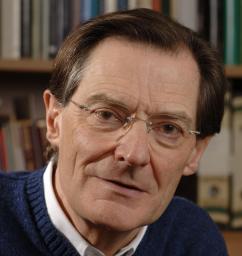Varsity Profile
Quentin Skinner
BORN:
Lancashire, 1940
48 YEARS
in Cambridge, since Skinner matriculated at Gonville and Caius
23 BOOKS
published and edited
12 LANGUAGES
into which 'The Foundations of Modern Political Thought', Skinner's first book, has been translated since he published it 30 years ago
Quentin Skinner will be stepping down as Regius Professor of Modern History at the end of this academic year, having reached the university's compulsory retirement age of 67.

"I'm leaving because I'm being told to go," he jokes. After relinquishing the Regius chair he will take up a position at Queen Mary, University of London, as a distinguished visiting professor in the humanities.
Skinner graduated from Caius in 1962 with a double-starred first in history, and was immediately elected to a teaching fellowship at Christ's upon finishing his Tripos. He describes this event as "a weird thing that would never, of course, happen nowadays", claiming that the sudden expansion of higher education in Britain in the 1960s made it easy for academics to find work.
Skinner has held this position ever since, and is also now an honorary fellow of Caius. He was appointed to the chair of political science in 1978, and became Regius Professor of Modern History in 1996. He was also one of the university's pro-Vice Chancellors in 1999.
Skinner wrote his first book during a four-year stay at Princeton. The Foundations of Modern Political Thought is now available in twelve languages, and was nominated by the Times Literary Supplement in 1996 as one of the most influential books of the previous 50 years.
Skinner is a central figure in the "Cambridge School" of the history of political thought, which treats political texts as historically-situated acts. His chief area of interest is the intellectual history of early modern Europe, particularly renaissance culture and 17th century political philosophy.
"I'm a historian, and much of my effort goes into trying to understand the circumstances in which particular theories were developed," he explains.
Skinner has also advocated an approach concentrated on trying to identify the motives for writing of authors such as Thomas Hobbes, Thomas More and Machiavelli.
He is married to Professor Susan James, who lectured in Philosophy in Cambridge for many years and is now teaching at Birkbeck, University of London. The couple have two children.
Skinner has just finished a new book describing the "crucial moment in the English Revolution when classical republican ideas of freedom were challenged by Hobbes's completely different understanding". Hobbes and Republican Liberty will be published by Cambridge University Press this February.
 News / CUP announces funding scheme for under-represented academics19 December 2025
News / CUP announces funding scheme for under-represented academics19 December 2025 News / Cambridge welcomes UK rejoining the Erasmus scheme20 December 2025
News / Cambridge welcomes UK rejoining the Erasmus scheme20 December 2025 Film & TV / Timothée Chalamet and the era-fication of film marketing21 December 2025
Film & TV / Timothée Chalamet and the era-fication of film marketing21 December 2025 News / SU reluctantly registers controversial women’s soc18 December 2025
News / SU reluctantly registers controversial women’s soc18 December 2025 News / News in Brief: humanoid chatbots, holiday specials, and harmonious scholarships21 December 2025
News / News in Brief: humanoid chatbots, holiday specials, and harmonious scholarships21 December 2025








